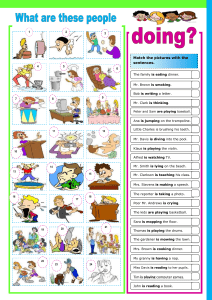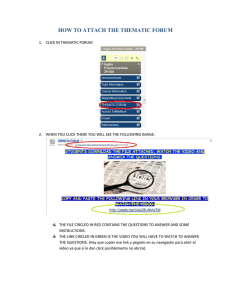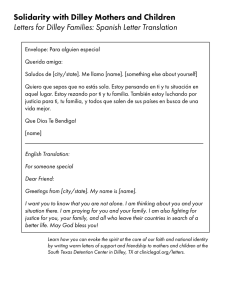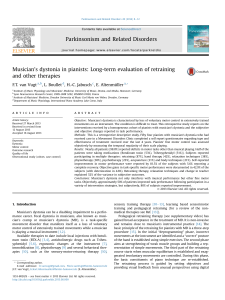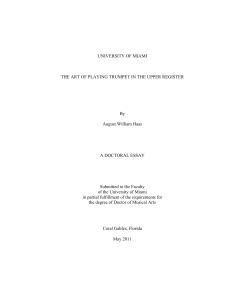Conflict Resolution: part 1
Anuncio
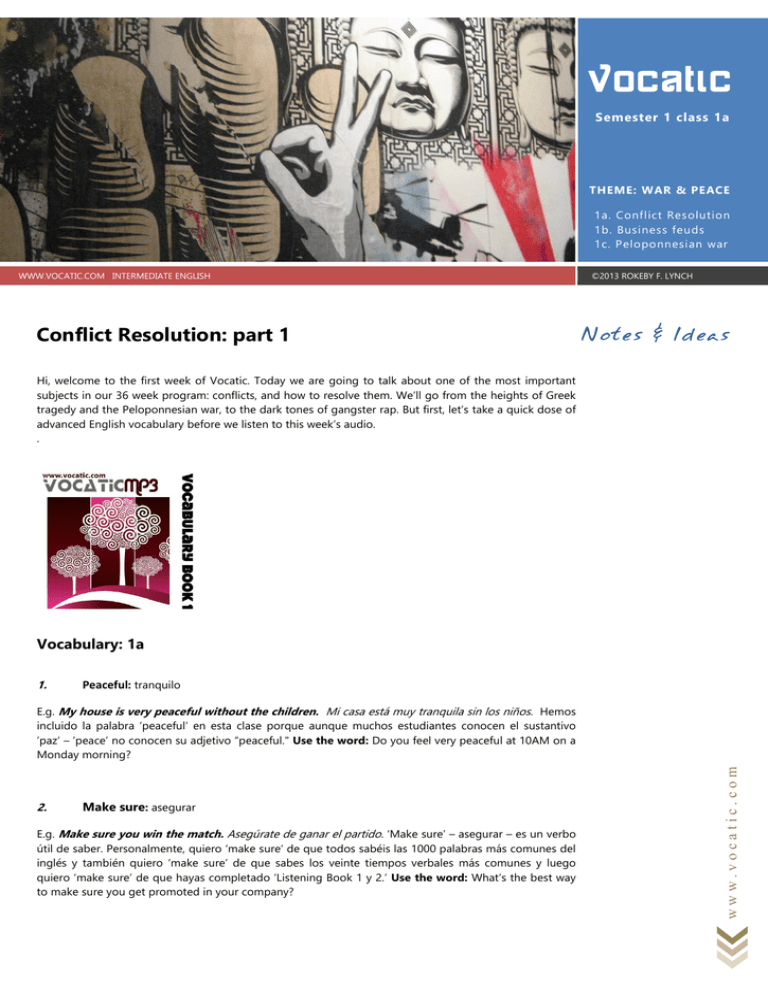
Vocatic Semester 1 class 1a THEME: WAR & PEACE 1a. Conflict Resolution 1b. Business feuds 1c. Peloponnesian war WWW.VOCATIC.COM INTERMEDIATE ENGLISH Conflict Resolution: part 1 ©2013 ROKEBY F. LYNCH Notes & Ideas Hi, welcome to the first week of Vocatic. Today we are going to talk about one of the most important subjects in our 36 week program: conflicts, and how to resolve them. We’ll go from the heights of Greek tragedy and the Peloponnesian war, to the dark tones of gangster rap. But first, let’s take a quick dose of advanced English vocabulary before we listen to this week’s audio. . Vocabulary: 1a 1. Peaceful: tranquilo 2. Make sure: asegurar E.g. Make sure you win the match. Asegúrate de ganar el partido. ‘Make sure’ – asegurar – es un verbo útil de saber. Personalmente, quiero ‘make sure’ de que todos sabéis las 1000 palabras más comunes del inglés y también quiero ‘make sure’ de que sabes los veinte tiempos verbales más comunes y luego quiero ‘make sure’ de que hayas completado ‘Listening Book 1 y 2.’ Use the word: What’s the best way to make sure you get promoted in your company? www.vocatic.com E.g. My house is very peaceful without the children. Mi casa está muy tranquila sin los niños. Hemos incluido la palabra ‘peaceful’ en esta clase porque aunque muchos estudiantes conocen el sustantivo ’paz’ – ’peace’ no conocen su adjetivo “peaceful." Use the word: Do you feel very peaceful at 10AM on a Monday morning? VOCATIC 3. Intermediate English 1 WWW.VOCATIC.COM © RORY LYNCH 2013 2 Such as: tal como E.g. There were many famous people there, such as Dani Alves. Había mucha gente famosa allí, tal como Dani Alves. ‘Such as’ – tal como – es la primera conjunción de este curso. Es una de esas pequeñas palabras, que causan problemas muy grandes de memoria. Recuerde... conjunciones tales como ésta deben repetirse una y otra vez. Use the word: Is it true that people such as Madonna don’t marry people who aren’t famous? 4. Wrong: incorrecto / no tener razón E.g. You’re wrong – Paris is not the capital of England. Te equivocas - París no es la capital de Inglaterra. Pronto en este curso vamos a escuchar la palabra "wrong" de nuevo, y vas a decir "Estoy seguro de que he escuchado esta palabra antes" y no te equivocaras. Cuando identificamos una palabra que es difícil de recordar para nuestros estudiantes lo usamos en clase muchas veces. Use the word: Is it wrong to travel on the train with no ticket? 5. Sides: lados E.g. Both sides in the negotiation wanted to stop fighting Los negociantes de ambas partes querían dejar de pelear. ’ Sides’ es una de esas palabras multifuncionales. Primero de todo, puede ser un lado físico: tú te sientas en un lado de la habitación, yo me siento en el otro. Pero también puede ser los lados en una guerra o un conflicto. Ahora es el momento de repetir las palabras de hoy – Peaceful: tranquilo, Wrong: incorrecto, Such as: tal como, Make sure: asegurar y Sides: lados. Okay, vamos a escuchar el audio de esta semana, pero recuerda, esta clase es sólo un módulo de la experiencia de aprendizaje única llamada Vocatic. Visita Vocatic.com y comienza a mejorar tu carrera, tu cultura general, y tu inglés. Descarga la versión gratuita ... ahora! In 1977 John Lennon composed ‘Imagine’ - his classic song about universal peace and a world without conflict; and what an appropriate name for the song, because unfortunately a world without conflict can only exist in the imagination. Conflict… is everywhere, and it has permanent consequences; divorce – with its effect on husband, wife and children – being the best example. Even if you have a peaceful life, a disagreement can emerge at any moment at work or in the family, and often, your friendships, marriage and career, depend on how you manage these disagreements. So today, let’s look at five principles that help both sides in a conflict arrive at a compromise. Number 1: Be realistic: Most conflicts are not black and white, right and wrong… almost always it’s grey, with right and wrong on both sides. So… stop being a fundamentalist. www.vocatic.com Listening and Reading - Harmony: 1b VOCATIC Intermediate English 1 WWW.VOCATIC.COM © RORY LYNCH 2013 3 Number 2: Be humble (humilde): There have been many times in your life where you were absolutely convinced you were right. But later you saw you were wrong. Therefore, you can never be certain that this is not the case in your current conflict. So… chill out. Number 3: Be intelligent: Intelligent people know two scientifically demonstrated phenomena – selective memory, and cognitive distortion. Basically, people remember what they want, and when looking for evidence they only look at the facts that are convenient, and eliminate the rest. This is human instinct, therefore you must remember that it’s impossible you are being truly objective. Number 4: Be empathy (empatia): During a conflict you must imagine everything the other person has passed through; the circumstances, misfortunes and factors that make them feel what they feel. When you see through their eyes you will be ready to compromise. Number 5: Be cautious (cauteloso): ‘winning’ a conflict, whether it’s a legal action or a schoolboy fight, does not end there. The greater your apparent ‘victory’ the more angry an opponent you leave behind you. Human beings love revenge, and if you have humiliated somebody and left them with nothing you can guarantee that conflict will return. Always, therefore, make sure both sides leave the fight with something. Okay, that’s it…. so, taking these five principles together, you’re now ready to enter a conflict with the right state of mind, which can be summarised as: calm down, open your mind, and get ready to compromise. However, those five points are all about attitude. In the complete Vocatic seminar on conflict we also look at other aspects: behaviour, for example, and the tone of your voice; logistical aspects such as… never conducting conflicts by e-mail or Wassap; and special cases like… toxic people who can never resolve anything. For the moment, however, that’s all we have time for, and all I will say in conclusion is that whatever philosophy of conflict resolution you follow… make sure you have one. Not having a conflict strategy is like fighting in the dark, and is as dangerous for you as it is for those who surround you. Ok, me gustaría terminar nuestra clase de hoy pidiéndoles un aporte a los estudiante. Tu tarea de escritura esta semana será visitar nuestra página web – Vocatic.com o nuestra página de Facebook – Vocatic escuela - y que nos cuentes lo que has aprendido en tu vida sobre la resolución de conflictos. Queremos que compartas con los demás estudiantes algún consejo que tengas sobre el tema. Bueno ... muchas gracias y nos vemos la semana que viene. 1. 2. 3. 4. 5. Why is ‘imagine’ an appropriate name for the song? What example does Rokeby give of a conflict with permanent consequences? What are the favourite colours of a fundamentalist believer in their own argument? There is a scientifically demonstrated phenomenon which shows people only choose certain types of facts in a conflict. Which facts? Is e-mail a good medium through which to conduct a conflict? www.vocatic.com Listening questions VOCATIC Intermediate English 1 WWW.VOCATIC.COM © RORY LYNCH 2013 4 Speaking: 1c 1. 2. 3. 4. 5. 6. 7. 8. 9. 10. All of us have a different persona for different contexts – as a parent, as a sportsman, as a boss, as a negotiator. Give the class a brief 1 minute profile of your conflict personality and general conduct in a conflict. To objectify it, speak in third person about yourself. For example “Jenny’s motto is simple… she’s always right and she’ll fight to the death rather than accept the contrary etc etc…” What were/are the majority of your conflicts about as a teenager with your parents? Can you tell us a specific story? What could both sides have done better to reduce the amount of conflict? Is physical violence justified in the following circumstances: someone verbally insults and humiliates you? Someone verbally insults and humiliates your mum? Your best friend sleeps with your wife/husband/boy/girlfriend? What do you do if someone jumps in front of you in a queue and refuses to move? What are the three most common types of argument between spouses and boy/girlfriends? Do you think that relationship counselling can work or that once a relationship is dead it’s dead? Try and give specific reasons. How is it possible that some conflicts like the Palestinian – Israeli problem can go on for so many years despite numerous presidents, experts, agreements and interventions? Try to avoid a political discussion and refer to each state as State A or State B instead of directly naming ‘Israel.’ Why is it that for all of its history Europe was at war, yet there has been no war in Western Europe since the 1940s? What has caused the elimination of armed conflict? Can you tell us about a serious incidence of conflict in the workplace you have witnessed or experienced personally? Talk about a previous company if you cannot talk about your current job. How was the conflict resolved? What are the 5 most annoying things people do on Facebook? Is it possible to have a conflict over something on Facebook. Do you agree with Rokeby’s advice that you shouldn’t have conflicts by email or Wassap? How do you define a toxic person? Listening answers Because according to Rokeby a world without conflict can only be achieved in our imagination. Divorce. Black and white. Convenient ones. Grammar: 1d www.vocatic.com 1. 2. 3. 4. VOCATIC Intermediate English 1 WWW.VOCATIC.COM © RORY LYNCH 2013 5 Se usa el presente continuo para hablar de una acción que está sucediendo justo en ese momento. Para formar el presente continuo se usa to be + el verbo + ing. Ing corresponde a las terminaciones ‘ando’ / ‘iendo’ en PRESENT CONTINUOUS español. Así que – ‘eating’ significa ‘comiendo.’ Un ejemplo de una frase en el presente continuo es… I’m playing and I’m singing. Estoy jugando y estoy cantando. She’s singing. El presente continuo tiene dos usos 1. Literalmente en el momento de hablar: I am walking down the street: Estoy caminando por la calle. 2. En esta época de tu vida: At the moment, I’m working at Vodafone: Actualmente estoy trabajando en Vodafone. She’s playing tennis. Problemas El problema para el hablante de español es que en su idioma se puede usar la forma de presente simple y presente continuo para hablar del momento. Por ejemplo: ¿Qué haces?- o- ¿Qué estás haciendo? Los dos pueden significar: What are you doing?’ En inglés esto no es posible. La única forma que se puede emplear para describir una acción que está sucediendo en ese momento es el ‘Present She’s dancing. Affirmative SUJETO + TO BE + VERBO + ING Negative SUJETO + TO BE + NOT + VERBO + ING Interrogative TO BE + SUJETO + VERBO + ING I am (I’m) playing I am not (I’m not) playing Am I playing? You are (you’re) playing Are you playing? He is (he’s) playing You are not (you’re not) playing (I’m) playing He is not (he’s not) playing She is (she’s) playing She is not (she’s not) playing Is she playing? It is (it’s) playing It is not (it’s not) playing Is it playing? We are (we’re) playing We are not (we’re not) playing Are we playing? They are (they’re) playing They are not (they’re not) playing Are they playing? Is he playing? www.vocatic.com continuous’.
